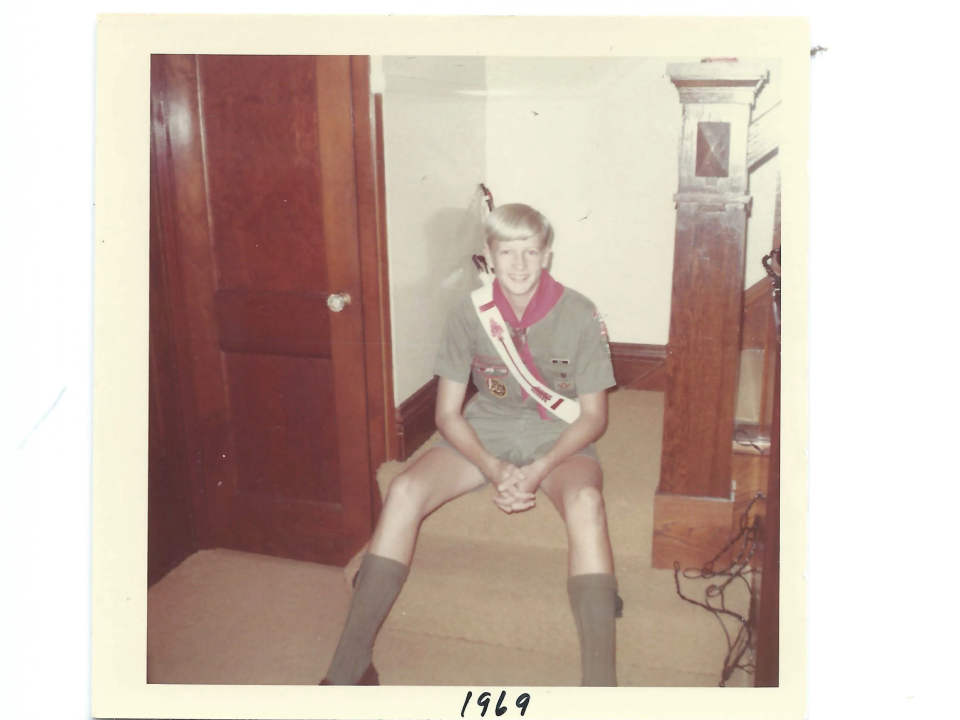Iowa sex abuse victim in Boy Scouts case could be among hundreds shortchanged by state law
Bill Vahl waited until the last minute to file his claim against the Boy Scouts of America.
Silent for most of his 71 years about the sexual abuse he alleges he suffered from a Dubuque adult Scout leader, Vahl said he had to think long and hard about his love for the Scouts, the crippling health issues he’s coped with all his adult life, and the at least 82,000 other men who say they endured sexual abuse as children at the hands of Boy Scout volunteers who turned out to be predators.
In the end, Vahl decided that becoming part of the nationwide settlement in 2020 was one way he could try to force the Scouts to better protect kids.
“I’d like to make them get better,” Vahl said. “Unwittingly, they have been a big player in this sex crimes business. They’re the ones who serve up kids to these predators. And after everything I’ve read, I thought this is the only way they are going to get serious about making change.”

Vahl, who now lives in Tucson, Arizona, is in the final stages of submitting pages of documents to the Boy Scouts’ $2.46 billion trust. That fund, approved last March for survivors owed claims as part of a federal bankruptcy case, began distributing payments last fall to men who were abused as children by troop leaders. It's the largest fund of its kind in U.S. history to settle sexual abuse claims.
But debate surrounding the settlements continues.
On Feb. 16, U.S. Supreme Court Justice Samuel Alito temporarily froze the settlements to give the court more time to decide a Feb. 9 request by 144 abuse claimants to block the settlements from moving forward. They have said the settlement deal unlawfully stops them from pursuing lawsuits against organizations that are not bankrupt, such as churches that ran Scouting programs, local Boy Scout councils and insurers that provided coverage to the Boy Scouts organization, the Reuters news service reported.
Vahl and several Iowa state legislators are also concerned that the roughly 300 to 350 Iowans involved in the settlement with the Boy Scouts of America will receive a fraction of awards they would be entitled to unless state legislators take action this year to change an Iowa law.
That’s because the current settlement uses a matrix that factors in a mix of variables ― including how much abuse was suffered, how long it lasted and different states' statutes of limitations on civil abuse claims ― to determine how much victims get paid.
Iowa’s statute of limitations requires victims in most instances to file civil cases in district courts by the age of 19. No other state in the U.S. sets the age so low. But the statute also allows victims to file suits within three years of when they made the connection between their abuse and their injuries.
Gilion Dumas, an Oregon attorney who is one of two lawyers appealing the national settlement agreement, has represented numerous Iowans in lawsuits against the national Scouting organization.
She said the matrix penalizes states with civil statutes of limitations that restrict who can file. If a victim was eligible for the maximum settlement of $2.7 million under the current agreement, the maximum claim value in Iowa would be reduced by about 60% to 70%, or to about $900,000, she said.
"What they say is, if you got to bring your claim in state court, there’s a really good chance the jury would throw it out because of the existing statute of limitations," she said. "That’s a pretty harsh argument. We’ve never lost a case in Iowa or Oregon based on the statute of limitations. And we argue you shouldn’t have to reduce the value of claims. But that’s what the matrix says."
In reality, she said, the settlement fund also doesn't have enough money for all the victims nationally, so what Iowans will wind up with is likely to be much less than the reduced amount.
"People might be paid 10% of the value because that’s how much is in the pot... that’s why we’re appealing. There’s not enough money to pay people," she said.
Spokespeople for the Boy Scouts of America, contacted Feb. 16, had not answered questions by the evening of Feb. 19 about the settlement agreement or the exact number of perpetrators and victims identified in Iowa in the bankruptcy case.
Bill would have to become law by April
State Sen. Janet Petersen, a Des Moines Democrat, said Iowa has one year from the effective date of the trust, or April 2024, to change state law or Iowa survivors will receive less than others around the country.
Child advocacy organizations have long considered Iowa’s civil statute of limitations to be one of the worst in the country. Petersen said the measure she proposed again this year would have eliminated the statute of limitation to file civil claims and given victims a revival window to file them. However, the bill, Senate File 2233, didn't make it through the Feb. 16 funnel, a deadline for bills to clear committee.
State Sen. Brad Zaun, R-Urbandale, who chairs the Senate Judiciary Committee, where similar legislation to lift the civil statute of limitations has stalled for several years, did not respond to phone calls or emails seeking comment.
Brad Epperly, a lobbyist who represents Iowa's Defense Counsel Association, the only organization registered against Senate File 2233, said eliminating the state's statute of limitations altogether would make it difficult for organizations or employers to defend themselves against years-old sex abuse allegations.
Under Iowa's existing law, he said, the state's statute of limitations doesn't start ticking until someone realizes they suffered sexual abuse as a minor and that abuse was the cause of their injuries. If the perpetrator and/or witnesses were dead, he said, allegations would be difficult for organizations to disprove.
Epperly said his group doesn't oppose eliminating the statute of limitations in regard to perpetrators, but it does oppose eliminating it for organizations and employers. "Ultimately, it's a policy decision" for state leaders, he said.
Supported by the Iowa Coalition Against Sexual Assault and the Iowa League of Women Voters, Senate File 2233 would eliminate the statute of limitations for those who suffer damages as a result of sex abuse, sex trafficking and sexual exploitation, and create a revival window for survivors outside the statute of limitations to file claims and receive 100% of damages.
But at this point in the legislative session, that measure or another would likely have to be offered as a leadership bill to have any hope of passing, Epperly said.
He said he doesn't fully understand the current matrix in the Boy Scouts settlement, but "that's the agreement they've made."
"It's a tough one," he said. "We've always implored (legislators) to limit the statute to the perpetrators ..."
Dumas, the Oregon attorney, who describes herself as a right-leaning independent, said the proposed statute change, thus far supported primarily by Democrats in Iowa, shouldn't be a partisan issue.
"In addition to supporting it for all the right moral reasons, this lets people follow the rule of law and file a civil lawsuit," she said. "It should not be a party issue. It creates a path forward for a person to sue the person or organization who wronged them. That’s our way."
Years of abuse, then crippling fatigue and pain

Once-secret internal files kept by the Boy Scouts of America, known as the ineligible volunteer, red list or “perversion" files, include more than 1,300 volunteers expelled from about 1965 to 1985 because they were suspected of abusing children.
The names, including Iowa Scout leaders, were released in 2012 after the first successful lawsuit by a survivor against the national Scouting organization in Portland. That case, filed by then-38-year-old Kerry Lewis after decades of quiet settlements, put the world's largest youth organization under the national spotlight and exposed its dark history of failing to protect children from pedophiles.
Those files do not include everyone who has been accused of abuse ― including James Hughes of Creston, a 73-year-old former troop leader who faces a trial this summer on allegations of inappropriate sexual conduct with at least five victims over a decade.
Hughes, a licensed physical therapist, served as the committee chair and merit badge counselor for Boy Scout Troop 63 in northeast Iowa from 2008 to 2018, according to court documents. But he wasn't charged until last summer with four counts of third-degree sexual abuse and six counts of lascivious conduct with a minor, serious misdemeanors. The victims were 13 to 16 years old at the time of the alleged offenses, court documents show.
Vahl has alleged his abuser was Kenneth Krakow, assistant scoutmaster of Dubuque’s Troop 23 from the mid-1960s to 1970, whose name was included in the perversion files when they were released. Krakow had been a volunteer with the troop since the 1930s and had served as scoutmaster previously.

In a letter sent to the national Boy Scouts organization in December 1970, a Scout executive from the Northeast Iowa Council notified the Boy Scouts of America that Krakow, then 49, had been engaging in sexual encounters with boys in the Dubuque area, letters released in the court case show.
“This fact he admitted freely to me in a conference. We have taken appropriate action here,” wrote Scout executive Max Burgoyne in a letter included in the released files.
Vahl said Krakow, who died in 1980, groomed him for more than a year, taking him to stock car races, on extra canoe trips and to run errands.
“He seemed like a cool guy. When he was around us boys, he would revert back into adolescence. He talked about sex and girls and Playboy," Vahl said. "We felt comfortable around him and trusted him.”
Krakow, Vahl said, sexually abused him at least 14 times from when he was about 12 until he was 15.
Vahl said he never was able to tell his parents, or anyone else, what happened.
“It was taboo,” he said. “My parents were pretty neurotic, religious and very conservative and straight-laced. It would have created very big problems in our house.”
Vahl, a civil engineer, said that after becoming a drum major in high school, he got his pilot’s license at 17 and graduated with honors from Iowa State University. But in his early 20s, he began experiencing crushing fatigue and pain that lasted decades.
Doctors at home and at the Mayo Clinic in Rochester, Minnesota, couldn’t figure out the origins of his illness and disagreed on how the neuromuscular fatigue should be treated. Vahl said he was exhausted and, most days, felt like he had the flu.
"From the time I was 24, I was overwhelmed with health problems," he said. "I was just trying to stay alive. Some days, it was minute by minute. I hate to be dramatic, but it really was like that."
The ensuing years brought periods of work, a stint on disability, then a greatly reduced work schedule that meant his wife, a teacher, had to be the primary breadwinner.
“My life was just destroyed,” he said. “I lived every day on the edge of suicide. The only thing that kept me going was that I always thought I could beat it. I was also raised as a Christian and suicide was looked down upon. And I didn’t want to embarrass and hurt my parents by doing that.”
Beginning in 2008, Vahl said, his energy slowly began to return after he built up his strength with regular long walks with his dog.
His lawyer suggested he be examined recently by a forensic psychiatrist to prepare for the settlement case. He said he told a psychiatrist about the abuse he suffered.
“He wrote that the sort of a trauma I experienced absolutely could have caused that illness,” he said.
Most survivors don't report abuse for decades
According to the Rape, Abuse & Incest National Network, or RAINN, a mix of studies shows it often takes decades for survivors to disclose that they were abused. A majority don’t until they are over 50.
Iowa state leaders in 2021 lifted the state’s statute of limitations for bringing criminal charges in several kinds of child sex abuse crimes. The law covers crimes including sexual abuse, incest, sexual exploitation and human trafficking.
At the time she signed the bill, Iowa Gov. Kim Reynolds said: "Iowa stands in support of survivors of sexual violence as we become the 14th state to eliminate the statute of limitations for these heinous crimes."
But the law does not cover civil claims, unlike a law that went into effect last year for victims who sue in federal courts. But most victims do not sue in federal court, and there are only two federal district courts in Iowa. The federal law also opened a two-year revival window for all expired claims.
Seventeen states, including Illinois, Minnesota and Nebraska, have no statute of limitations for civil lawsuits in such cases.
Vahl said he believes Iowa victims should have the same right under law to hold people and organizations accountable. He points to statistics from RAINN that suggest only 6% of perpetrators of rape will ever end up in jail.
“There are very, very few 18-year-olds or 17-year-olds or 16-year-olds that have the maturity that it takes to walk in to a lawyer’s office or a police station, or (go to) their parents to explain that they were sexually molested,” he said. “However, later in life they often have the courage to confront the issue and file a criminal charge or initiate a civil case.”
Once the Boy Scouts of America was sued, he said, the bankruptcy court also required the organization to institute sweeping changes in the way troop leaders were vetted. The settlement required sex abuse training for the leaders, parents and boys. And it required more parental involvement in camping outings.
“These are examples of how a civil lawsuit can reform programs for the better and make huge improvements in people’s lives,” Vahl said.

Lee Rood's Reader's Watchdog column helps Iowans get answers and accountability from public officials, the justice system, businesses and nonprofits. Reach her at lrood@registermedia.com, at 515-284-8549, on Twitter at @leerood or on Facebook at Facebook.com/readerswatchdog.
This article originally appeared on Des Moines Register: Iowa Boy Scouts sex abuse victims could get less in national settlement

